不定代词
不定代词
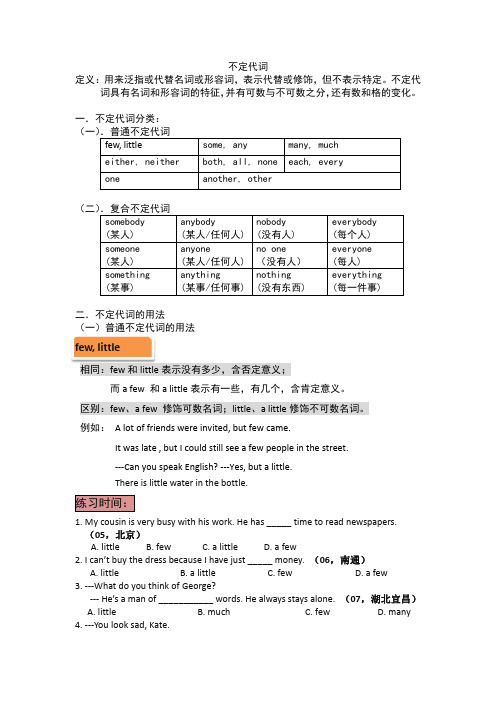
不定代词定义:用来泛指或代替名词或形容词,表示代替或修饰,但不表示特定。
不定代词具有名词和形容词的特征,并有可数与不可数之分,还有数和格的变化。
一.不定代词分类:二.不定代词的用法(一)普通不定代词的用法而a few 和a little表示有一些,有几个,含肯定意义。
区别:few、a few 修饰可数名词;little、a little修饰不可数名词。
例如:A lot of friends were invited, but few came.It was late , but I could still see a few people in the street.---Can you speak English? ---Yes, but a little.There is little water in the bottle.1. My cousin is very busy with his work. He has _____ time to read newspapers.(05,北京)A. littleB. fewC. a littleD. a few2. I can’t buy the dress because I have just _____ money. (06,南通)A. littleB. a littleC. fewD. a few3. ---What do you think of George?--- He’s a man of ___________ words. He always stays alone.(07,湖北宜昌)A. littleB. muchC. fewD. many4. ---You look sad, Kate.---Yeah. I have made _______ mistakes in my report. (07,武汉)A. a littleB. littleC. a fewD. few5. ____ children there are in a family, ____ their life will be.(07,陕西工大附中)A. The less, the betterB. The fewer, the betterC. Fewer, richerD. More, poorer例:He has some Chinese paintings.Ask me if you have any questions.Do you have any questions to ask?I don’t know any of the students.3.特殊用法:some 用于疑问句,表示希望对方得到肯定回答的疑问句里any用于肯定句,表示“任何”例:Would you like some bananas?(邀请)Mum, could you give me some money? (请求)You may take any of them.1.There isn’t ________ water in the glass. Let’s go and get some.(08,北京朝阳)A. manyB. lotsC. anyD. some2. I asked her for _________ milk, but she didn’t have ________ .(08,茂名)A. any; someB. some; anyC. some; some3. ______ police officers in the UK carry guns, but most of them don't.(08,徐州)A. NoB. SomeC.ManyD. All4. There is_____ salt in the kitchen. Would you like to go to the store and get ____? (镇江市)A.little, some B. little, any C. a little, some D. a little, any相同:many和much都表示“许多”不同:①many修饰或代替复数可数名词,much修饰或代替不可数名词。
不定代词用法总结

不定代词用法总结不定代词是在句子中代替特定人或物的词语,它们的使用能够让句子更加简洁明了。
下面是对不定代词的用法做一个总结。
1. 一般不定代词一般不定代词包括"something"、"anything"、"nothing"、"everything"等,它们用来代替不具体指向的事物。
例如:- I have something to tell you.- Is there anything I can do for you?- Don't worry, it's nothing serious.- She knows everything about that topic.2. 不定代词"some"和"any""some"和"any"可以用作不定代词,也可以用作不定代词,具体使用要根据句子的语境来确定。
当"some"用作不定代词时,表示肯定或推测的意思。
例如:- There are some books on the table.- Can I have some water, please?当"any"用作不定代词时,表示否定或疑问的意思。
- I don't have any money with me.- Do you have any ideas for the project?3. 不定代词"somebody"、"anybody"、"nobody"和"everybody"这些不定代词用来代替人。
它们的使用方式类似于前面提到的一般不定代词。
例如:- Somebody is waiting for you outside.- Nobody knows the answer.- Can anybody help me with this problem?- Everybody enjoyed the party.4. 不定代词"each"和"every""each"和"every"用来代替三者或多者中的每一个。
英语语法 不定代词有哪些常见的例子
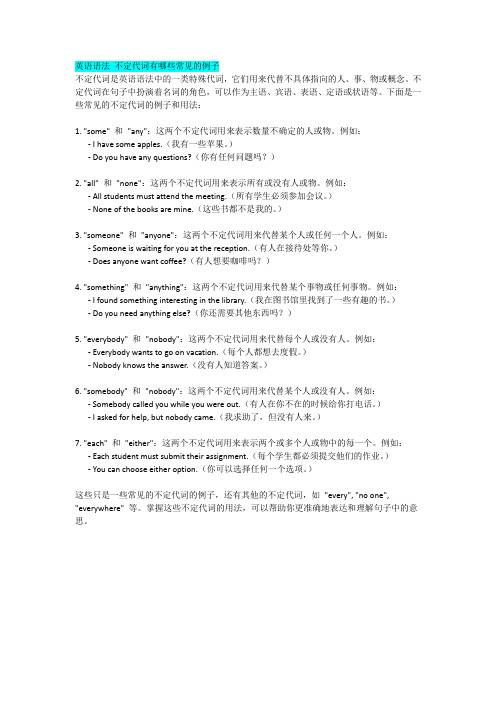
英语语法不定代词有哪些常见的例子不定代词是英语语法中的一类特殊代词,它们用来代替不具体指向的人、事、物或概念。
不定代词在句子中扮演着名词的角色,可以作为主语、宾语、表语、定语或状语等。
下面是一些常见的不定代词的例子和用法:1. "some" 和"any":这两个不定代词用来表示数量不确定的人或物。
例如:- I have some apples.(我有一些苹果。
)- Do you have any questions?(你有任何问题吗?)2. "all" 和"none":这两个不定代词用来表示所有或没有人或物。
例如:- All students must attend the meeting.(所有学生必须参加会议。
)- None of the books are mine.(这些书都不是我的。
)3. "someone" 和"anyone":这两个不定代词用来代替某个人或任何一个人。
例如:- Someone is waiting for you at the reception.(有人在接待处等你。
)- Does anyone want coffee?(有人想要咖啡吗?)4. "something" 和"anything":这两个不定代词用来代替某个事物或任何事物。
例如:- I found something interesting in the library.(我在图书馆里找到了一些有趣的书。
)- Do you need anything else?(你还需要其他东西吗?)5. "everybody" 和"nobody":这两个不定代词用来代替每个人或没有人。
例如:- Everybody wants to go on vacation.(每个人都想去度假。
不定代词用法总结
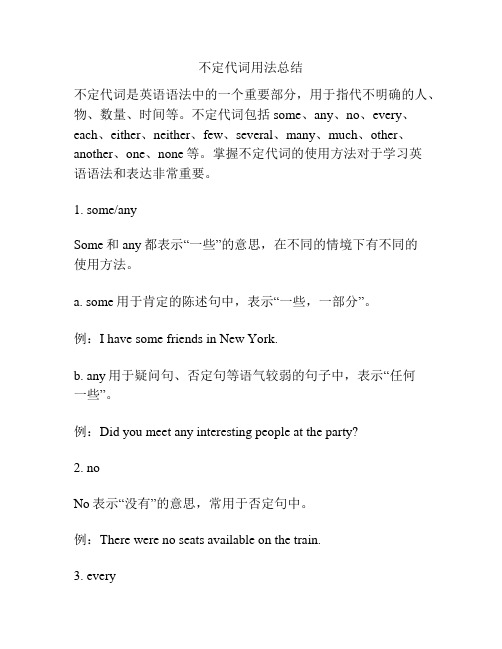
不定代词用法总结不定代词是英语语法中的一个重要部分,用于指代不明确的人、物、数量、时间等。
不定代词包括some、any、no、every、each、either、neither、few、several、many、much、other、another、one、none等。
掌握不定代词的使用方法对于学习英语语法和表达非常重要。
1. some/anySome和any都表示“一些”的意思,在不同的情境下有不同的使用方法。
a. some用于肯定的陈述句中,表示“一些,一部分”。
例:I have some friends in New York.b. any用于疑问句、否定句等语气较弱的句子中,表示“任何一些”。
例:Did you meet any interesting people at the party?2. noNo表示“没有”的意思,常用于否定句中。
例:There were no seats available on the train.3. everyEvery表示“每一个”的意思。
例:Every student is required to attend the meeting.4. eachEach表示“每一个”,用于强调个体。
例:Each student is responsible for his or her own progress.5. either/neitherEither表示“两者中的任何一个”,neither表示“两者都不”。
例:You can choose either the blue or the red dress.例:Neither of us likes to cook.6. few/several/many/much这些代词都用于表示数量或程度。
a. few表示“很少,几乎没有”。
例:There were few people in the park on such a hot day.b. several表示“几个,若干”。
不定代词

You can do it in class. You can also do it at home. (保持原意) You can do it _______ in class ______ at home. either or Cathy hasn’t been to China. Nor has Jenny. (保持原意) Neither Cathy _____Jenny _____ been to China. nor has ______
1.Be quiet, boys and girls . I have ____
to tell you.
A. important something
B. something important
C. anything important
D. important anything
考点二:谓语动词的单复数
连线
1.It’s too heavy to carry. 2.Can I have some breakfast? 3.I’m hungry. 4.Who can solve this problem? 5.Is someone near us? A.No.There’s nobody there. B.Let’s get something to eat. C.No,you can’t eat anything. D.Please ask somebody to help us. E.I believe everybody can.
6. Liu Xiang and Yao Ming are worldfamous sports stars. Both of them ____ set a good example to us. C A. has B. are C. have D. is
不定代词

第一部分:语法---不定代词常用的不定代词有:some(某个,某些), any(任何一个,一些), no(没有),none(没有人或物), many(许多), much(许多), a few(一些), few(很少, 几乎没有), alittle(一些), little(很少, 几乎没有),each(每个), every(每个), one(一个), both(两者都), all(所有的), either(二者之一), neither(两者都不), other(别的,其他), another(另一个), 还有由some, any, no, every 开头构成的复合不定代词, 如:someone,anybody, everything, no one 等。
1. 常用来修饰可数名词复数的不定代词有many, a few, few, both, either, neither ;常用来修饰不可数名词的有much, a little, little ;可数与不可数两者都可修饰的有some, any ,如:He has already made a few friends in China.Would you give me a little paper?2. Some, something, somewhere, everything, everywhere 常用于肯定句,any,anything, anywhere 常用于疑问句和否定句;none, nothing, nowhere 常用于否定句且本身表否定,如:I’m looking for my watch everywhere but I don’t find it anywhere .I have some water but I have not any tea.注意:当说话者希望得到肯定回答时,some 和some 的复合代词也可用于疑问句中,如:Would you like something to eat?Could you please give me some help?3. 由some, any, no, every 开头构成的复合不定代词,做主语时,谓语要用第三人称单数。
不定代词
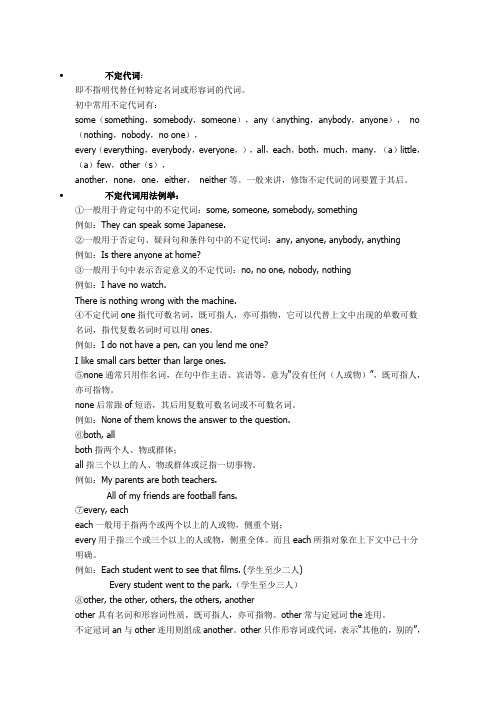
∙不定代词:即不指明代替任何特定名词或形容词的代词。
初中常用不定代词有:some(something,somebody,someone),any(anything,anybody,anyone),no (nothing,nobody,no one),every(everything,everybody,everyone,),all,each,both,much,many,(a)little,(a)few,other(s),another,none,one,either,neither等。
一般来讲,修饰不定代词的词要置于其后。
∙不定代词用法例举:①一般用于肯定句中的不定代词:some, someone, somebody, something例如:They can speak some Japanese.②一般用于否定句、疑问句和条件句中的不定代词:any, anyone, anybody, anything例如:Is there anyone at home?③一般用于句中表示否定意义的不定代词:no, no one, nobody, nothing例如:I have no watch.There is nothing wrong with the machine.④不定代词one指代可数名词,既可指人,亦可指物,它可以代替上文中出现的单数可数名词,指代复数名词时可以用ones。
例如:I do not have a pen, can you lend me one?I like small cars better than large ones.⑤none通常只用作名词,在句中作主语、宾语等。
意为“没有任何(人或物)”,既可指人,亦可指物。
none后常跟of短语,其后用复数可数名词或不可数名词。
例如:None of them knows the answer to the question.⑥both, allboth指两个人、物或群体;all指三个以上的人、物或群体或泛指一切事物。
不定代词与复合代词
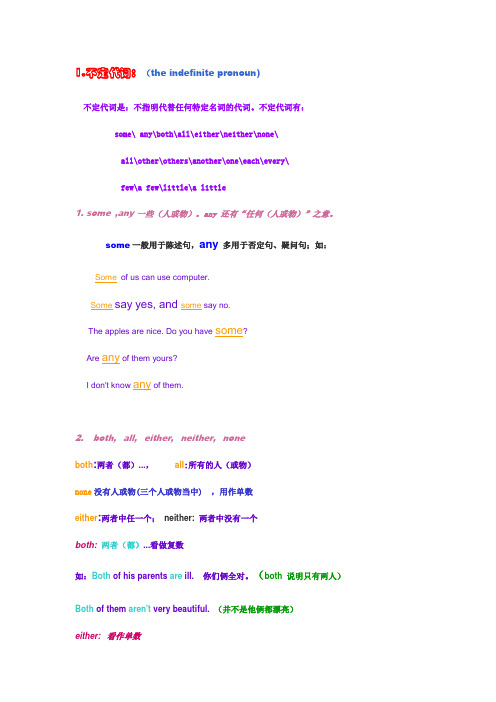
1.不定代词:(the indefinite pronoun)不定代词是:不指明代替任何特定名词的代词。
不定代词有:some\ any\both\all\either\neither\none\all\other\others\another\one\each\every\few\a few\little\a little1. some,any 一些(人或物)。
any 还有“任何(人或物)”之意。
some一般用于陈述句,any多用于否定句、疑问句;如:Some of us can use computer.Some say yes, and some say no.The apples are nice. Do you have some?Are any of them yours?I don't know any of them.2. both, all, either, neither, noneboth:两者(都)...,all:所有的人(或物)none没有人或物(三个人或物当中) ,用作单数either:两者中任一个;neither:两者中没有一个both:两者(都)...看做复数如:Both of his parents are ill. 你们俩全对。
(both说明只有两人)Both of them aren't very beautiful.(并不是他俩都漂亮)either: 看作单数如:Either of us may(情态动词)join the party. 你们(两人)中任何一个可以参加聚会。
Come to my home on Friday or Saturday. Either of them is ok.周五或周六来我家吧。
这两天中,哪天都行。
There's coffee or tea - you can(情态动词)have either (of them).咖啡或茶──你可以任选一种。
不定代词

不定代词基本用法1. 不定代词大都可以在句中作主语、宾语、表语、定语,起着名词和形容词的作用。
例如:Both of them are doctors. 他们两人都是医生。
(作主语)I saw nothing in the box. 我看到盒子里什么也没有。
(作宾语)It is something strange. 那是很奇怪的事情。
(作表语)There is a little juice in the glass. 玻璃杯里有一些果汁。
(作定语)Could you come a little earlier? (不同提法,a little可以理解为相当于副词作状语)2. 如果主语是不定代词some-(something,somebody,someone),any-(anything,anybody,anyone),No-(nothing,nobody,no one),every-(everything,everybody,everyone-),a (little), less, , much, one,another,nobody, nothing, neither, each,either 等时,谓语动词用单数形式。
例如:There is little water in the glass. Please bring me more. 杯子里没有水了,请再给我取点。
Nobody is ready to help me. 没有人准备帮我。
3. 如果主语是several,both, many,(a)few,others 等时谓语动词用复数。
例如:Both of them are doctors. 他们两个都是医生。
4. 如果主语是all, none, some, any, such, more, most等时谓语动词用单数或复数要根据实际情况而定。
例如:All the books are mine. 所有这些书都是我的。
不定代词
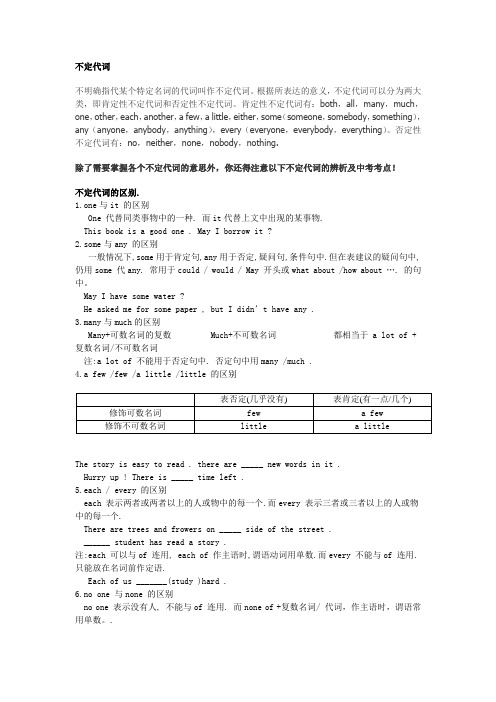
不定代词不明确指代某个特定名词的代词叫作不定代词。
根据所表达的意义,不定代词可以分为两大类,即肯定性不定代词和否定性不定代词。
肯定性不定代词有:both,all,many,much,one,other,each,another,a few,a little,either,some(someone,somebody,something),any(anyone,anybody,anything),every(everyone,everybody,everything)。
否定性不定代词有:no,neither,none,nobody,nothing.除了需要掌握各个不定代词的意思外,你还得注意以下不定代词的辨析及中考考点!不定代词的区别.1.one与it 的区别One 代替同类事物中的一种. 而it代替上文中出现的某事物.This book is a good one . May I borrow it ?2.some与any 的区别一般情况下,some用于肯定句,any用于否定,疑问句,条件句中.但在表建议的疑问句中,仍用some 代any. 常用于could / would / May 开头或what about /how about …. 的句中。
May I have some water ?He asked me for some paper , but I didn’t have any .3.many与much的区别Many+可数名词的复数 Much+不可数名词都相当于 a lot of +复数名词/不可数名词注:a lot of 不能用于否定句中. 否定句中用many /much .4.a few /few /a little /little 的区别The story is easy to read . there are _____ new words in it .Hurry up ! There is _____ time left .5.each / every 的区别each 表示两者或两者以上的人或物中的每一个.而every 表示三者或三者以上的人或物中的每一个.There are trees and frowers on _____ side of the street .______ student has read a story .注:each 可以与of 连用, each of 作主语时,谓语动词用单数.而every 不能与of 连用.只能放在名词前作定语.Each of us _______(study )hard .6.no one 与none 的区别no one 表示没有人, 不能与of 连用. 而none of +复数名词/ 代词,作主语时,谓语常用单数。
不定代词用法归纳总结知乎
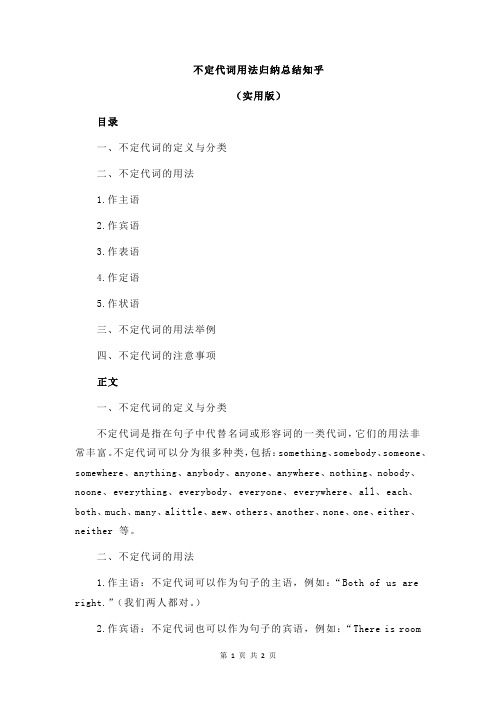
不定代词用法归纳总结知乎(实用版)目录一、不定代词的定义与分类二、不定代词的用法1.作主语2.作宾语3.作表语4.作定语5.作状语三、不定代词的用法举例四、不定代词的注意事项正文一、不定代词的定义与分类不定代词是指在句子中代替名词或形容词的一类代词,它们的用法非常丰富。
不定代词可以分为很多种类,包括:something、somebody、someone、somewhere、anything、anybody、anyone、anywhere、nothing、nobody、noone、everything、everybody、everyone、everywhere、all、each、both、much、many、alittle、aew、others、another、none、one、either、neither 等。
二、不定代词的用法1.作主语:不定代词可以作为句子的主语,例如:“Both of us are right.”(我们两人都对。
)2.作宾语:不定代词也可以作为句子的宾语,例如:“There is roomfor all of us.”(我们所有的人全坐得下。
)3.作表语:不定代词可以作为句子的表语,例如:“That"s nothing.”(没什么。
)4.作定语:不定代词可以作为句子的定语,例如:“You may take either road.”(两条路你走哪条都行。
)5.作状语:不定代词可以作为句子的状语,例如:“I can"t find my book anywhere.”(我在任何地方都不能找到我的书。
)三、不定代词的用法举例以下是一些不定代词在句子中的实际用法举例:- Both of them are teachers.(他们两人都是教师。
)- I know nothing about this person.(我对这个人一无所知。
)- This book is too much difficult for a child.(这本书对一个小孩来说太难了。
不定代词的种类和用法

不定代词的种类和用法不定代词是一类用以替代特定名词或名词短语的词语,不具体指代任何特定的人或物。
它有着广泛的应用场景,在句子中起到了很重要的作用。
本文将介绍不定代词的种类和用法。
1. 不定代词的分类不定代词可以分为以下几类:泛指不定代词、特指不定代词、否定不定代词、疑问不定代词和连接不定代词。
1.1 泛指不定代词泛指不定代词用来泛泛地代替不具体的人或物,包括:“someone”(某人)、“somebody”(某人)、“something”(某事物)、“everyone”(每个人)、“everybody”(每个人)、“everything”(每件事物)、“anyone”(任何人)和“anything”(任何事物)等。
例如:- Someone called you earlier.(有人给你打电话了。
)- Everybody is excited about the upcoming party.(每个人都对即将到来的派对感到兴奋。
)1.2 特指不定代词特指不定代词用于特指某个人或物,包括:“this”(这个)、“that”(那个)、“these”(这些)和“those”(那些)等。
例如:- This is the book I was talking about.(这就是我刚才谈到的那本书。
)- Those are the shoes I want to buy.(那些就是我想买的鞋子。
)1.3 否定不定代词否定不定代词用于否定句中,包括:“no one”(没有人)、“nobody”(没有人)、“nothing”(没有任何事物)、“neither”(也不)、“none”(没有)和“nor”(也不)等。
例如:- Nobody knows the answer to this question.(没有人知道这个问题的答案。
)- I have neither time nor interest in going to the party.(我既没有时间也没有兴趣去参加派对。
不定代词

不定代词一、定义:指代不确定的人或事物的代词叫不定代词。
英语中的不定代词常常成对出现,如some 和any, all 和both, neither 和either, each 和every, other 和another, much 和many, one 和no, none和no one, few 和a few,little 和a little,等等。
另外,还有由some, any, every, no 与body, one, thing 构成的复合不定代词:somebody, anybody, everybody, nobody, someone, anyone, everyone, no one, something, anything, everything, nothing。
some 和any都可修饰或指代可数名词和不可数名词;但some 一般用于肯定句,any一般用于疑问句和否定句和条件状语从句。
eg: I must get some fruit in the market.Do you have any books for children?If there is any thing difficult, please let me know.【考点】1. 当表示请求或要求并希望对方能给出肯定的回答时,some 也可用于疑问句;eg: Would you like some tea?Could you lend me some money?2. any 表示“任何的”之意时,也可用于肯定句。
eg: You can come here any time.Any student can answer this question.任何学生都可以回答这个问题。
Ex:1. Would you like ______ more?两者三者都both all都不neither none任何either any在···之间between among•both… and…两者都,作主语时,谓语动词用复数形式•all (of)指三者或三者以上的都•either…or指两个中的任意一个, 指“不是。
不定代词

注意:some 用于其他句式中: 1). 肯定疑问句中:说话人认为对方的答案会是 肯定的,或期望得到肯定回答时。Would you like 句式中,表委婉请求或建议,如: Would you like some coffee? Could you lend me some money.?
2). some 用于否定句表示部分否定。 I haven‘t heard from some of my old friends these years. 这些年我没有收到一些老朋友的信
2.no 和 none: none (没有一个,全不,都不) 是名词性的不定代词,可作主语和宾 语,常和of 短语连用,不作定语。none 作主语代替不可数名词时,谓 语用单数形式。代替可数名词时,谓语用单复数均可。 None of us is / are from Beijing. None of the money is mine. none 与 all 相对,有 “全不” “全部” 的含义,因此 all 是全肯定, none 是 all 的全部否定,但都指三者以上的人或物。 We all made mistakes. None of us was correct. no 是形容词性的不定代词,只能用作定语,可修饰可数和不可数 名词。no 等于 not a 或 not any 加上名词。例如: I have no money. I have no pen= I have not a pen. I have not any money. no one 相当于 nobody,意为没有人,谓语用单数。
some 与 any及其合成词 1. He has _____ Chinese paintings. some any 2. Do you have ____ questions to ask? any 3. Ask me if you have ____ questions. any 4. I don’t know _____ of the students. 5. Mum,could you give me ____ money? some 6. Shall we getsomething ______ interesting to read? something 7. I am thirsty, would you get _____ to drink for me? 8. The problem is quite easy. Anybody can _____ solve it .
不定代词

返回 | 分享 | 收藏不用冠词的情况1、国名,人名前通常不用冠词。
如:England英国 Mary玛丽2、名词前有this, that, my, your, whose, some, any, no, each, every等词时,不用冠词。
如:Thisis my hat. 这是我的帽子。
3、在表示交通工具、学科名称的名词前不加冠词。
如:by plane by boat onfootChinese4、在季节、月份、节日、假日、日期、星期等表示时间的名词之前,一般不用冠词。
如:Springis coming. 春天要来了。
Wego to school from Monday to Friday. 我们从星期一到星期五都上课。
5、在三餐、球类运动和娱乐运动的名称前,不加冠词。
如:have breakfast吃早饭 playchess玩象棋6、在一些固定词组中不加冠词。
冠词是一种虚词,不能独立使用,通常放在名词的前面,分为“不定冠词”和“定冠词”两种。
1、不定冠词:a、an。
用在单数名词前,表示“一个,一件……”。
an用在以元音“音素”开头的单词前。
如:an e-mail, an orange, anold man, an English watch, an hour…2、定冠词:the。
用在单数或者复数名词前。
the没有具体意思,有时翻译为这、那。
它的基本用法:(1)用来表示特指某(些)人或某(些)事物。
如:The map on the wall isnew.(2)表示说话者双方都知道的人或事物。
如:Look at the picture,please.(3)表示再次提到前面谈过的人或事物。
如:This is a stamp. The stampis beautif ul.(4)用在表示世界上独一无二的事物前。
如:the sun太阳the moon月亮the ear th地球(5)用在由普通名词构成的专有名词前。
不定代词_精品文档

A. every
B. each
C. each of
② There is a line of trees on ___ side of the street.
A. every
B. each
C. both
③ She goes shopping __ five days.
A. every B. each C. each of
none(三者或三者以上)都不
否定意义表单数
① ___ of the girls ___ him.They asked him for name card.
A. Neither; know
B. Either; know
C. Neither; knows
② Both of his parents ___ teachers.
⑧
e from B.is from C.is come from
四、the other, others, the others, another的区别
other adj./pron.其他的/其他 the other adj./pron.(两者中)另一个 others pron.其他的事物 the others pron.(三者或三者以上范围内)其他的事物 another adj./pron.另一的/另一个
×√ every one of these dictionaries。
each&every的区别
2.each可指两个或两个以上中间的每一个 every只可指三个或三个以上中间的每一个
e.g.each of my eyes
√ × every one of my eye √ every one of my toes(脚趾)
不定代词
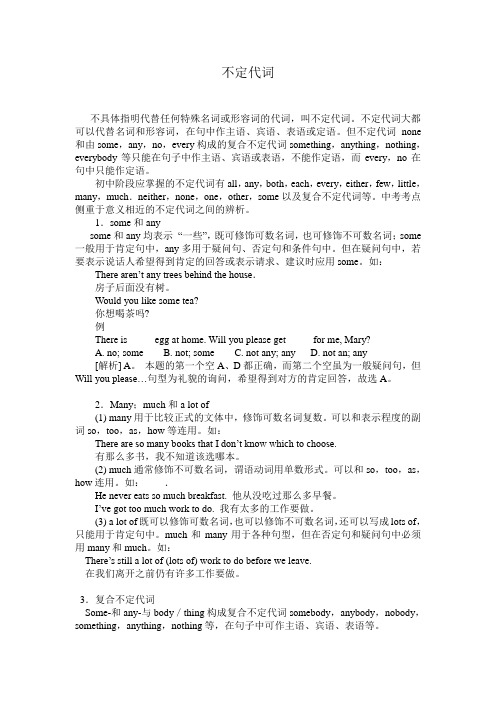
不定代词不具体指明代替任何特殊名词或形容词的代词,叫不定代词。
不定代词大都可以代替名词和形容词,在句中作主语、宾语、表语或定语。
但不定代词none 和由some,any,no,every构成的复合不定代词something,anything,nothing,everybody等只能在句子中作主语、宾语或表语,不能作定语,而every,no在句中只能作定语。
初中阶段应掌握的不定代词有all,any,both,each,every,either,few,little,many,much.neither,none,one,other,some以及复合不定代词等。
中考考点侧重于意义相近的不定代词之间的辨析。
1.some和anysome和any均表示“一些”,既可修饰可数名词,也可修饰不可数名词;some 一般用于肯定句中,any多用于疑问句、否定句和条件句中。
但在疑问句中,若要表示说话人希望得到肯定的回答或表示请求、建议时应用some。
如:There aren’t any trees behind the house.房子后面没有树。
Would you like some tea?你想喝茶吗?例There is_____ egg at home. Will you please get_____ for me, Mary?A. no; someB. not; someC. not any; anyD. not an; any[解析] A。
本题的第一个空A、D都正确,而第二个空虽为一般疑问句,但Will you please…句型为礼貌的询问,希望得到对方的肯定回答,故选A。
2.Many;much和a lot of(1) many用于比较正式的文体中,修饰可数名词复数。
可以和表示程度的副词so,too,as,how等连用。
如:There are so many books that I don’t know which to choose.有那么多书,我不知道该选哪本。
不定代词知识点总结

不定代词知识点总结不定代词是不指明代替任何特定名词或形容词的代词,在英语语法中有着重要的地位。
下面我们将对不定代词的主要知识点进行总结。
一、不定代词的种类不定代词主要包括 some,many,much,little,few,one,ones,no,neither,nor,each,every,all,both,neither…nor…,only 等。
这些词可以表示人、事物或抽象概念,是构成句子中不可缺少的一部分。
二、不定代词的用法1、替代词:不定代词可以替代名词或名词短语,避免重复。
例如:Can you pass me the book? (用 the book代替 the one I mentioned earlier)。
2、修饰词:不定代词可以用来修饰名词或名词短语,表示数量、程度、性质或特征。
例如:I have a few friends here. (表示数量);He is much taller than her. (表示程度);They are some good books. (表示性质)。
3、构成句子成分:不定代词在句子中可以作主语、宾语、表语或定语等。
例如:Each of us has a different opinion. (作主语);I will do what I can to help. (作宾语);This is none of your business. (作表语)。
三、不定代词的特殊用法1、both…and…:表示“两者都”,连接两个并列的主语时,谓语动词要用复数形式。
例如:Both she and I are students.2、neither…nor…:表示“既不……也不……”,连接两个并列的主语时,谓语动词要用单数形式。
例如:Neither he nor she likes music.3、other than:表示“除了”,相当于 but或 except。
不定代词
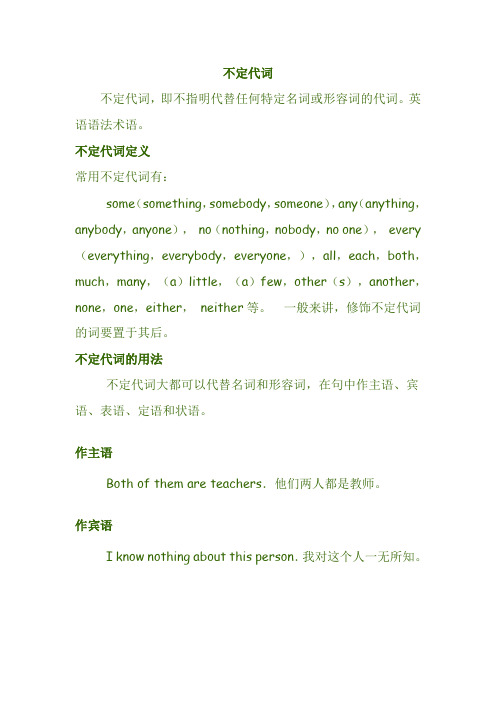
不定代词不定代词,即不指明代替任何特定名词或形容词的代词。
英语语法术语。
不定代词定义常用不定代词有:some(something,somebody,someone),any(anything,anybody,anyone),no(nothing,nobody,no one),every (everything,everybody,everyone,),all,each,both,much,many,(a)little,(a)few,other(s),another,none,one,either,neither等。
一般来讲,修饰不定代词的词要置于其后。
不定代词的用法不定代词大都可以代替名词和形容词,在句中作主语、宾语、表语、定语和状语。
作主语Both of them are teachers.他们两人都是教师。
作宾语I know nothing about this person.我对这个人一无所知。
作表语This book is too much for a child.这本书对一个小孩来说太难了。
作定语There is a little water in the glass.玻璃杯里有一些水。
作状语I can't find my book anywhere.我在任何地方都不能找到我的书。
修饰不定代词的词,一般情况下要后置.不定代词用法举例一般不定代词用法例子1.some 一些,某些,某个不定代词some可以代替名词和形容词,常用在肯定句中作主语、宾语、定语等。
作定语时,它可以修饰可数名词(单、复数皆可)和不可数名词。
例如:some are doctors,some are nurses.有些人是医生,有些人是护士。
(作主语)2.any一些,任何不定代词any可以代替名词和形容词,常用在否定句或疑问句中作主语、宾语、定语等。
作定语时,它可以修饰可数名词(多为复数)和不可数名词。
例如:there isn’t any ink in my pen.我的钢笔没有墨水。
不定代词的分类总结

不定代词的分类总结不定代词是指在句子中替代特定名词或名词短语的代词。
它们的特点是可以表示泛指、不确定或未指定具体成员的概念。
在英语中,不定代词可以分为几个不同的类别,本文将对其进行分类总结。
1. 无名可数不定代词无名可数不定代词用于表示泛指的概念,且与可数名词复数形式或不可数名词连用。
常见的无名可数不定代词有:- some:表示肯定或陈述性的意义,指一些或一定数量的人或物。
例如:Some people like swimming.- any:表示否定、疑问或不确定的意义,指任何人或任何物。
例如:Do you have any questions?- no:表示全面否定的意义,指没有人或事物。
例如:No oneknows the answer.- every:表示泛指的意义,指每一个人或物。
例如:Every student should participate in the activity.- each:表示个体化的意义,指每个人或物。
例如:Each student needs to prepare for the exam.2. 有名可数不定代词有名可数不定代词用于表示特定的人或物,通常带有某种修饰。
常见的有名可数不定代词有:- this:表示靠近说话者或最接近的人或物。
例如:This is my book.- that:表示远离说话者或较远的人或物。
例如:That is my house.- both:表示两个人或物,强调二者都是如此。
例如:Both of the books are interesting.- either:表示两个人或物中的任意一个,强调二者择一。
例如:You can take either of the two routes.- neither:表示两个人或物中的没有一个,强调二者都不是如此。
例如:Neither of them is available.3. 不定代词和疑问代词的结合使用有时,不定代词和疑问代词可以结合使用以形成新的意义。
- 1、下载文档前请自行甄别文档内容的完整性,平台不提供额外的编辑、内容补充、找答案等附加服务。
- 2、"仅部分预览"的文档,不可在线预览部分如存在完整性等问题,可反馈申请退款(可完整预览的文档不适用该条件!)。
- 3、如文档侵犯您的权益,请联系客服反馈,我们会尽快为您处理(人工客服工作时间:9:00-18:30)。
不定代词用法举例一般不定代词用法例子1.some 一些,某些,某个不定代词some可以代替名词和形容词,常用在肯定句中作主语、宾语、定语等。
作定语时,它可以修饰可数名词(单、复数皆可)和不可数名词。
例如:some are doctors,some are nurses.有些人是医生,有些人是护士。
(作主语)2.any一些,任何不定代词any可以代替名词和形容词,常用在否定句或疑问句中作主语、宾语、定语等。
作定语时,它可以修饰可数名词(多为复数)和不可数名词。
例如:there isn’t any ink in my pen.我的钢笔没有墨水。
(作定语)不定代词any有时也可以用在肯定句中,表示"任何的"。
例如:you may come at any time;i’ll be home the whole day.你任何时候来都行,我整天都将呆在家里。
不定代词any也可以用作副词,做状语,表示程度。
例如:is he any better today?他今天好一点了吗?3.all 全体,所有(指三者以上)不定代词all在句中可以作主语、宾语、表语、定语或同位语。
它可以代表或修饰可数名词和不可数名词。
代表或修饰可数名词时,指两个以上的人或物。
作先行词时,引导词用that。
例如:all were present at the meeting.全都到会了。
(作主语,代表可数名词)4.both 全部,都不定代词both指两个人或事物。
和all一样,可以用作主语、宾语、定语或同位语。
例如:we invited both to come to our farm.我们邀请两个人都来我们的农场?(作宾语)5.none 无人或无不定代词none的含义和all物相反,和no one,not any同义,但其用法相当于名词,在句子中一般作主语或宾语。
它代替不可数名词作主语时,谓语动词用单数形式;代替可数名词作主语时,谓语动词用单、复数皆可。
例如:none of the problems is /are easy to solve.这些问题没有一个是容易解决的。
(作主语,代替可数名词)6.either 两者之中的任何一个,这个或那个。
不定代词either 可以作主语、宾语和定语。
例如:either of them will agree to this arrangent.他们两人中会有人同意这样的安排的。
(作主语)7.neither 两者都不不定代词neither 是either 的否定形式,可以作主语、宾语和定语。
例如:neither is interesting.两个都没有趣。
(作主语)8.each 每个,各自的不定代词each指每一个人或事物的个别情况,甚至指这些个别情况各不相同。
它在句中可以作主语、宾语、定语和同位语。
例如:she gave the children two apples each.她给了每个小孩两个苹果。
(作the children的同位语。
)9.every 每个,每一的,一切的不定代词every有"全体"的意思,和all的意义相近,但只能作定语。
复合不定代词使用例子1. some, any, every, no都能和one, body, thing一起构成代词,这些代词叫复合不定代词。
它们基本含义为:指人somebodysomeone 某人anybody 、anyone :任何人everybody 、everyone:每人nobody 、no one :没人指物Something某物某事anything任何事物everything一切nothing没东西2. 一般情况下,some构成的复合不定代词,其作用和some相同,用于肯定句;any构成的复合不定代词用于否定句或疑问句;no构成的复合不定代词表示否定含义,用于否定句。
如:①I have something to tell you. 我有事要告诉你。
②He didn’t say anything at the meeting yesterday. 昨天在会上他没发言。
③Everybody likes swimming. 每个人都喜欢游泳。
④There is nothing wrong with your ears.你耳朵没毛病。
3. something可用于提建议或请求的问句中,以及希望说话对方作出肯定回答的问句中。
如:Would you like something to eat? 你要吃点东西吗?4. 复合不定代词在句子中作主语时,谓语动词一般用单数形式。
如:Nobody knows his name. 没有人知道他的名字。
5. 不定代词的定语要后置。
如:Is there anything important in today’s newspaper? 今天的报纸上有什么重要新闻吗?一般的,不定代词(包括复合不定代词)在句子中,通常用第三人称单数形式6。
复合不定代词的否定。
1、“not every-”表示的是部分否定,意为“并非都,不都”。
例如:Not everything will go well. 并非一切都会那么顺利。
The teacher didn’t call everyone’s name.老师并没有点所有人的名。
2、“not any-”和no-均表示全否定。
例如:He listened, but heard nothing.他听了听,但什么也没听到。
= He listened, but didn’t hear anything.You haven’t called anyone/anybody up, have you? 你没给谁打过电话,是吗?= You have called no one/nobody up, have you?注意:在反义疑问句中陈述部分用no, nothing, nobody, never, few, seldom, hardly, rarely, little等否定含义的词时,疑问部分用肯定含义。
The Swede made no answer, did he / she?Some plants never blown (开花), do they ?陈述部分由neither… nor, either… or 连接的并列主语时,疑问部分根据其实际逻辑意义而定。
Neither you nor I am engineer, are we?13) 陈述部分主语是指示代词或不定代词everything, that, nothing, this, 疑问部分主语用it。
Everything is ready, isn't it?陈述部分主语是不定代词everybody, anyone, somebody, nobody, no one等,疑问部分常用复数they,有时也用单数he。
This is our new headmaster, isn’t it?Those are Japanese, aren’t they?One should be ready to help others, shouldn’t on e?One can’t be too careful, can you?Each of the students has a dictionary, hasn’t he?Each of the students passed the examination, didn’t they?None of his money is left, is it?None of his friends are interested, are they?None of his friends has come, has he?Something will have to be done about the price, won’t it?Everybody is kind to you, aren’t they?No one left here yesterday, did they?Someone turned that radio down, don’t they?Neither side could win, could they?Everythin g that he says is false, isn’t it?三、复合不定代词的用法特点复合不定代词包括 something, somebody, someone, anything, anybody, anyone, nothing, nobody, no one, everything, everybody, everyone 等。
它们在句中可用作主语、宾语或表语,但不能用作定语。
something, someone 等和 anything, anyone等的区别与 some 和 any 的区别一样,前者一般用于肯定句,后者一般用于否定句、疑问句或条件句(参见 any & some)。
具体使用时应注意以下几点:1. 复合不定代词受定语修饰时,定语应放在它们后面:There is nothing wrong with the radio. 这收音机没有毛病。
Have you seen anyone [anybody] famous? 你见过名人吗?2. 指人的复合不定代词若用作主语,其谓语动词一般用单数,相应的人称代词和物主代词也用单数 he, him, his (不一定指男性)。
但在非正式文体中常用复数代词 they, them, their:Everyone knows this, doesn’t he [don’t they]?人人都知道这一点,不是吗?If anybody [anyone] comes, ask him [them] to wait. 要是有人来,让他等着。
3. 指事物的复合不定代词若用作主语,谓语动词只能用单数,相应的人称代词也只能用 it,而不用 they:Everything is ready, isn’t it?一切都准备好了,是吗?4. 不定代词 anyone, everyone 等只能指人,不能指物,且其后一般不接of 短语。
若是指物或后接 of 短语,可用 any one, every one (分开写):any one of the boys (books) 孩子们(书)当中的任何一个(本)every one of the students (schools) 每一个学生(一所学校)四、不定代词any与not连用——是any not 还是 not any按英语习惯,any 以及含有any的复合不定代词用于否定句时,它只能出现在否定词之后,而不能在否定词之前:误:Any one doesn’t know how to do it.正:No one knows how to do it. 任何人都不知道如何做它。
